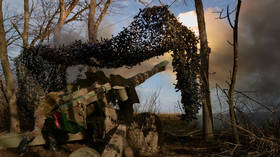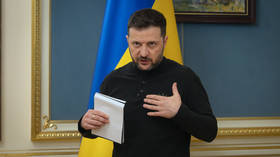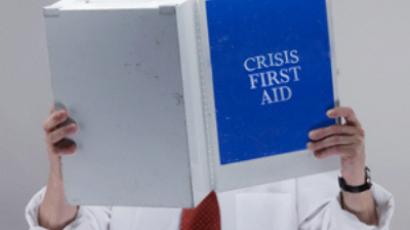Putin takes on desperation of crisis-hit town
Russian Prime Minister Vladimir Putin has rounded on closed enterprise bosses and local officials, demanding that wages be paid out by the end of Thursday. The money is reported to have already been transferred.
According to the Leningrad region government, 63 million rubles ($2 million) has already been transferred to the town’s enterprises’ bank accounts, which includes money to pay outstanding wages, Ria Novosti news agency reports.
Protests in the crisis-hit town started a month ago. On Thursday, Prime Minister Putin arrived in Pikalevo, a town in northern Russia, to personally monitor the situation.
“The wage debt worth 41,240,000 rubles ($1.3 million) must be paid off today,” Putin said, adding that the necessary funds were transferred to the enterprises’ accounts in state savings bank Sberbank on Wednesday.
People must not “fall victims to businesses’ ambitions and greed”, he also pointed out.
The Pikalevo Alumina Refinery, which used to be one of Russia’s industry leaders, is just another dead enterprise now. It was purchased by Baselcement – a company affiliated with Basic Element, the holding company belonging to Russia‘s former richest man Oleg Deripaska, who is now heavily in debt.
Deripaska accompanied the prime minister during his visit to the factory. Looking at the facilities, Putin made a comment that they have “turned the factory into a scrap-yard”. However, the owners argued they got it already in such a poor state as it is now.
About 400 jobless workers staged a protest earlier this week that blocked a highway for seven hours. Following that, the regional government promised to provide some money to help tide over the 4,000 unemployed workers, which is about one-fifth of the town’s population.
A town of one job
Pikalevo is a typical Russian “monogorod”: the local economy and budget, and thousands of jobs, are all dependent on a single industry. And when, one day, the economic crisis made it stop producing anything, it eventually affected every single family.
The residents of Pikalevo have been waiting for quite a long time, but months of uncertainty without money and hope have pushed them onto the streets. Even the police have failed to persuade the crowd.
Protesters say they no longer believe a single word – they want action.
“You say you can give us fruit – but we don’t need fruit! We need meat! We have nothing to eat, and nothing to wear! And you are talking about fruit!”
The first protests took place in the town a month ago. Then, the head of the local trade union warned that angry and hungry people could go further. It seems today that she wasn't so far from the truth
Many Pikalevo-like towns were created across the country during the Soviet planned economy and they are all suffering these days. Their future will depend on how authorities deal with this particular case in Pikalevo. Their actions could prevent others from protesting, but could just as equally fuel people’s anger.
Nationalize it?
Earlier, Russia’s State Duma committee on social policy had suggested nationalization. If this measure is approved, Pikalevo could become the first such case in Russia’s modern history.
But some analysts say this is just not an option.
“This would be a serious political mistake,” said Evgeny Gontmakher from the Institute of Economy at the Russian Academy of Sciences. “It won’t help the industry to revive. It’ll be a deadlock anyway. It won’t be anywhere near effective. Sooner or later, the situation will repeat itself. It needs stronger management and working with people.”














